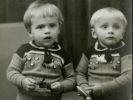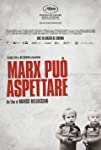Eye For Film >> Movies >> Marx Can Wait (2021) Film Review
Marx Can Wait
Reviewed by: Anne-Katrin Titze

Marco Bellocchio is one of the supreme masters of family dynamics on the screen. Marx Can Wait (Marx Può Aspettare, a highlight in the Spotlight programme of the 59th New York Film Festival)), his documentary about his own family, most importantly about his twin Camillo, makes it clear why he is so good at it. Marx Can Wait starts with the Bellocchio clan gathered around a horseshoe table on December 16, 2016 in Piacenza (it is fascinating how a table can feel inclusive or not - I was invited by the Museum of Modern Art and Luce Cinecittà to an Open Roads: New Italian Cinema long table lunch at Il Gattopardo for the launch of the book on Marco Bellocchio’s films and felt more welcome and at ease than at many a professional luncheon).
The surviving Bellocchio siblings are present, Letizia, Piergiorgio, Maria Luisa, Alberto, and Marco himself, with their wives, children and grandchildren. We hear a speech about “uncle Camillo,” an “angel” whose absence dominates the movie. Marco is seen sitting in-between his two sisters as they speak about his birth and how he was “the first” with Camillo lagging behind three hours and “in bad shape.” The priest came to baptize his brother three times, and Marco only once, a haunting detail which introduces the leitmotif of this breathtaking documentary and something that weaves through Bellocchio’s oeuvre: “Mama was obsessed with Hell!”

The siblings embark on a discussion about limbo and how the church got rid of it, while purgatory is still an option. Letizia, who is deaf, recounts how she was away at school when the two new little Bellocchios were born on November 9, 1939, and how she hadn’t even noticed that Mama was pregnant. She also had no idea where babies came from and thought that perhaps her brothers were dropped off and taken in. This is one of the many moments where this film opens up wide into the past, into losses, misconceptions, and stratagems of times past when information, or misinformation for that matter, was not a mere google search away.
A magical belief system, good and bad, hangs over any worthwhile family history. Bellocchio juxtaposes eloquently what we see with what we hear. Mussolini speaks in June 1940; the twins in a photograph stare with wide open mouths. In July 1944 bombs fall on Piacenza. In April 1945 the city is liberated. The Bellocchios were all for the monarchy then. In 1948 communism presented a vague threat. When the family moved to a large apartment, the arrangement of rooms appears to have had lasting and devastating consequences. While Marco shared a room with Alberto, Camillo was placed with Paolo, “the madman,” the oldest brother with severe mental difficulties. Nobody seems to have thought of Camillo and his “melancholy.”
We see family photographs with lion cubs. Piergiorgio held it secret that their father had cancer, a word so feared that it couldn’t be uttered. Camillo was the only one, the siblings remember, who cried hysterically at their father’s funeral. He was Papa’s favorite and the most handsome. The sister of Camillo’s girlfriend Angela adds to the commentary. Nobody seemed to have realized the depth of Camillo’s pain and how difficult it actually was for him to find purpose in his life so filled with rejections.
And yet, it is not easy to get a sense of Camillo when so much of what we hear is contradictory. No smooth picture emerges and that is the point. There is a photo of Camillo by a tank in the military and his gym. Marco and Piergiorgio with all their “great intelligence, great sensibility, great precision” did not understand their brother. The sisters who still to this day seem to live in a different realm from the boys and brother Alberto who calls himself mediocre - none of them has come to terms with what happened and this is why the film was made.
While Alberto talks to Marco, they sit in a room filled with extra furniture. In my family it was called the sewing machine room, and lo and behold - here you see a sewing machine, too. Bellocchio knows that it is these kinds of detail that jump from soul to soul and latch on to the most profound of memories with universal reach. Old furniture and dark memories are neighbors. Shortcomings and regrets live there. Marco seems surprised by a letter that speaks about Camillo’s lack of space and a twin’s hopelessness overlooked. Was there room for him, the brother with no vocation, as well in the world of cinema? As Marco’s movie career started to lift off, why drag along his brother? Schadenfreude, lack of care, many a human feeling is haunting this narrative.
1965 brings an award at Locarno for Fists in the Pocket, entirely shot in his hometown of Piacenza. Luigi Cancrini, a psychiatrist, comments on the importance of being seen by the eyes of a mother. Their mother, troubled by her oldest son and the deaf daughter, had great sorrows and may not have sufficiently “seen” the younger twin?
1967, the older one is doing swell, winning a special prize in Venice. Marco didn’t want to be a bourgeois artist any longer. “Marx can wait” responded the younger, “I have other primary needs before that of serving the people.” Busy serving the world, where does family fit in? The sisters come across as unwilling to face anything head-on to this day. Family tragedy and failures of love bewitch this film because that is what bewitches us all. Shifts in understanding are like earthquakes. Mama Bellocchio got to a point where she understood why someone would take drugs. She remembered a woman in her childhood, so we hear, who drank because she had sorrows and was scorned. A shift in understanding by a parent is rare and momentous and here it puts a mother’s biblical terror in perspective.
Jesuit priest Virgilio Fantuzzi listens on camera to Marco’s explanations: “We made up dreams to try to support mother’s religious belief and desperate pain” he says. Bellocchio’s films speak volumes about the power of make believe. There is a clip from 1982’s The Eyes, the Mouth, with the marvelous Emmanuelle Riva talking to a terrifying visitation by her dead son. “Mama, you won’t forget me, will you?” He pleads with her and terrorizes her. Is a brother falling apart in front of their eyes enough for a family to react?
Marco was with his twin for 29 years and, so he says, didn’t understand a thing. Piergiorgio, the great intellectual of the family, didn’t grasp their mother with her religious faith. The family portrait is devastating. “We siblings all lived a life of arid unhappiness; the basics were all there but in terms of affection, it was a desert,” concludes Marco, the artist in the desert. When he tells the priest about his guilt of not loving Camillo enough, he gets confronted with his filmic output, because the priest “through the screen” felt the confession. This most profound work of art about understanding too late is more than a confession, it is a revelation.
Reviewed on: 29 Sep 2021















